Loose Buttons: Just Guys Being Dudes
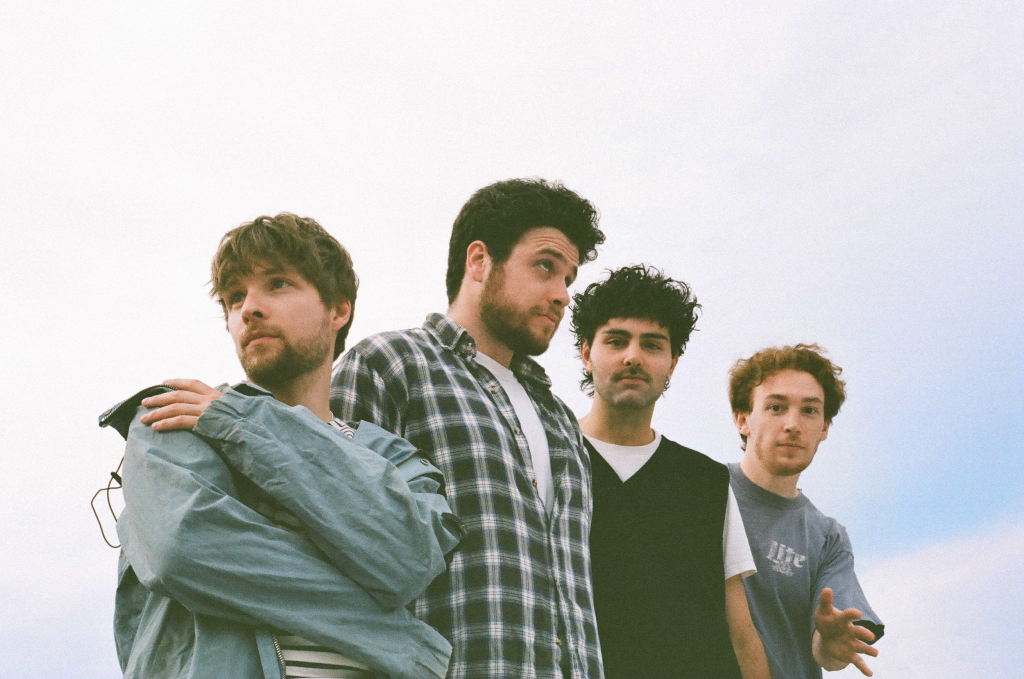
The year is 2004. Lower Manhattan and Brooklyn are spitting out indie rock bands. The nights are dark and the city isn’t sleeping. Tiny venues are crammed with sweaty bodies. Overdriven guitars through vintage amps fill the air. There’s Eric Nizgretsky and Zack Kantor, eleven years old, both totally mesmerised by The Strokes. Together, they start their first iteration of their band, Sins of the Loose Buttons. Flash forward ten years, Manny Silverstein and Adam Holtzberg join, and “Sins of the” is dropped. Loose Buttons released their debut album, Something Better, right before COVID-19. With the world unraveling in chaos, the band used lockdown to learn and grow. On October 22nd, we were gifted the followed up album, What’s on Outside. What’s on Outside is the summer we all lost last year featuring gained maturity. A much more polished sound than the garage feeling from Something Better.
FRONTRUNNER talks with Nizgretsky about anxiety, vulnerability, hope, and oranges.

How was your album release weekend?
It was a lot of fun. It definitely took until Sunday for the high of the evening to dissipate. Friday was great. I had butterflies for the first time prior to getting on stage, but then I got on stage, and it felt as natural as possible. The fans were great. I couldn’t have asked for anything more. Before the pandemic, we put out our debut record and only got to play songs from that record once. At that show, I remember just seeing fans singing the words and these were absolute random fans too, not the ones from our New York community. I kind of over the pandemic forgot about how that felt. But getting back on stage this time around and seeing that happening again, it truly is an incredible feeling. Plus, we had a pretty wild after party so I got to hang out with people and celebrate. It truly was perfect.
Yeah, you seemed really excited on the stage. You had a really big, a really great performance aspect with a lot of dancing.
Thank you. I did have a blast. For me, I feel more comfortable on that stage than I do anywhere else. I feel like sometimes in the real world, I have to be a little bit more guarded and think a little bit more about the words I’m going to try to say. Whereas on stage, you can let go and at the core of it, that’s the real me you see on the stage.
I see how that’d be scary, but freeing.
Yeah, it’s very freeing.
What was it like writing and recording this album during COVID?
It was definitely very different, but at the same time, it felt the exact same as the first record. At the end of the day, I get to write music with my best friends and that’s genuinely a gift I don’t take for granted. What made this process different was, no pun intended, what “was on outside.” That definitely kind of lent a hand into things I wanted to discuss and talk about on the record. It was the first time that I ever kind of wanted to dabble and discuss societal trends as opposed to talking about myself or a love interest or something like that this time around. I mean, how could you ignore the things that we were seeing? So, through that, I realized that there are certain topics that I’m not the spokesperson for, and that’s totally fine. That’s a good thing. But it made me think a lot about, how I fit into all of this? And trying to make sense of it all. Through that, I then realized it was the strongest tool for a good inward look as well.
Like writing, right?
Exactly. By taking a look at what was going on outside it allowed me to reflect on myself. So that was kind of the biggest difference, I would say.
What did you learn about yourself from recording and using the outward to look inward?
I learned that there’s no issue with being vulnerable and being honest about some of the fears that I have. I was trying to find parallels and metaphors. For example, on “Minor Leaguer,” I was using the metaphor of my dreams, and how they aren’t quite where I want them yet, and using that as a metaphor for the way a minor league hockey player feels. I’m a diehard Ranger fan so using them as a metaphor was a ton of fun. Then on a song like “First to Know, [Last to Understand],” I kind of literally just laid it on the line. It just felt like the music needed that angst and it just felt right. But then songs like “Window Seat” and “What’s On Outside,” those are definitely taking a look at the things that were going on socially. Again, it made me then realize I need to sometimes sit and listen.
I noticed that too, especially with, like you said “Minor Leaguer.” The other few opening songs touched upon anxiety for pursuing music but still had this underdog feeling, too.
That’s perfectly said. I mean, for me it is that. I don’t know sometimes how to convey it more than just saying it, but I’m the luckiest person on the planet because I get to play music with my best friends. The cherry on top is that we got to work with Joe Reinhart from Hop Along. He produced this record and he’s become like a brother to me too and a mentor and a guru and all that stuff. I’m so lucky that I get to use our music as a way to meet new people and do it with my best friends and family.
Speaking of your best friends and family, how did you convince Manny to join you and Zack?
Well, Manny was my freshman year roommate in college. I think I annoyed the absolute shit out of him while being his roommate. Manny is very reserved, the sweetest, nicest kid, but very reserved, and I’m very outgoing and have a bit of a bravado sometimes. But I do think that he and I were able to connect musically because you kind of shed all that shit away once you start writing and you see the vulnerability. I didn’t understand that at the time, but we were both actually being vulnerable. Over time I think he saw that and I saw that in him. It took like a full semester for me to be like, dude just play with us! Eventually I finally convinced him. At the time we had another guy play drums with us and it wasn’t working so we had to steal Adam – we call him Swag – from another band.
How did you steal him?
In college, we were playing house party shows. Adam was and still is a beast behind the kit. He’s an incredible drummer. I just felt like we needed that in the band, we needed someone with that type of tenacity. So, it’s kind of simple. There was a mutual admiration and to be honest he was actually not that hard to steal. Easiest thing I’ve ever stolen, actually.

He didn’t have ties with his first band?
I think he was willing to drop those.
Going even earlier than those years. If you could go back, what would you tell the 11 year old version of you and Zack?
I mean it’s hard because we’re literally doing the exact thing that we always dreamt of doing. I think when you’re a kid, you don’t understand size well. You definitely think things are going to be a lot bigger or a lot smaller. I think the goal that I always had was I just wanted people to like my music more than just my mom. I think I hit that goal already and that is an addictive feeling. Now my goal is just to reach more people because again that is the most addictive feeling – seeing people feel the vulnerability through the lyrics or the way the music makes them dance. I think we’re doing exactly what we set out to do.
That’s great. How do you manage to be so vulnerable in your lyrics? Does it scare you at all? How do you continue to keep doing it? I write my my own personal essays and I’ll be vulnerable in that, but I get really scared to share. How do you deal with sharing?
I used to feel a little anxious about it. I then changed my whole outlook on it when I realized that we all kind of share some sort of anxiety. We all share these types of feelings; they just manifest themselves in different ways. I learned that if I can just convey my sort of fears, worries, loves, anxieties, then someone will find a common ground in that. At first, I was more guarded. I think that’s why I would write kind of cheesy love songs. It was an easier thing to do. The reason why I started writing lyrics was because my dad gave me a lyric book when I was a little kid during the time my parents were going through a pretty bad divorce. He was just like, why don’t you write in this. I always had that in the back of my mind and I started doing that. I always had a kind of a hard time articulating those thoughts into songs, to me they kind of were separate things. Once I kind of understood how to do that, that is where it all clicked – I actually became a songwriter when that happened.
How did you go about understanding bringing the two together?
I think I still am always trying to figure that out more. I started to understand that words have melodies to them. The way certain words fall, there’s a melody to it. Once I understood that, I think the chords followed. In many ways, we start a lot with a full melody of just like Green Eggs and Ham kind of just like bullshit lyrics. Then I start to take the poetry that I have written and try to massage it in. As long as it works and I feel like the music is conveying what I’m trying to say, then we’ve got a perfect marriage.
How else do you feel like Loose Buttons changed from 2014 Damage Gallery to 2021 What’s On Outside?
It’s night and day. I think we didn’t figure ourselves out as a band until our first record. Something Better kind of changed everything. I think that song in particular was the song that was just like, “Oh, okay, we’re a band. This is what we do. We are being us. Then on this record, it was like alright, we know who we are now, but how do we evolve? How do we try to not replicate the same thing that we did?” I do think that, at least in my opinion, we did do that on this record. I think that’ll always be our goal with staying true to who we are.
Do you ever feel nostalgic for the era of New York music scene from when you were a teenager compared to when you first started feeling more like a band?
Definitely. I’m a true New Yorker, so I remember being a little kid when The Strokes started to pop off. That was really cool for me, but I was really young. I got to watch that. Then I remember starting to head out to Williamsburg in that scene when Death By Audio was the venue where everyone was playing at. I am nostalgic of that because looking at New York right now, we really barely have 300 capacity venues anymore. It’s a sad thing. I do hope maybe the one beautiful thing about COVID is maybe it’ll open up an opportunity for more of those types of venues to come. We were really excited about The Dance in the city. We were like, that’s awesome, we get another great 300 capacity room, but it of course had to shut down. Those are the best type of shows, where it’s really crowded and crammed and good energy.

25 October 2021
Photo credit: Alex Brown
Seeing a band like The Strokes coming up and being a teenager in New York at that time, does that influence you or any of your work? Do you bring any of that in?
Absolutely. As the great Alex Turner said, “I just wanted to be one of The Strokes.” That’s all I wanted to be; that’s all Zack wanted to be. I mean, that’s all we still want to be. I definitely – when The Strokes were coming out – started ripping holes in my jeans, throwing on converse, and trying to fit into blazers because that was the look. The only blazer I could fit into was my mom’s, and my mom’s a very short, petite woman. That was the only thing I could fit into and it still looked ridiculous on me, but it was part of the look. On our first record, we worked with Gus Oberg, who produced them so that was a pinch me moment too, working in the room with him. He very much had the kind of the mentality that The Strokes had at that time. He was just like, do whatever because if you’re doing that, that’s just cool, that’s what your music is at that moment. Joe, on the other hand, was perfect for us on this record because he was really pushing us to evolve. That’s exactly what we wanted to do. We kind of needed both of them in our lives.
Going back to Alex Turner, what are your thoughts on Tranquility Base Hotel & Casino?
He’s my God. I think he’s the best in the game. That record, I wouldn’t say that we’ll ever make a Tranquility Base Hotel & Casino type of record, but that’s so admirable what he did. They had AM, which was an incredible pop-rock record, and to follow it up with a lounge jazz record that set on the moon. I mean, that sounds like a SNL skit, but they actually pulled it off. That takes gravitas to pull that off. I have admiration for that in the same way that David Bowie was constantly evolving and The Beatles were changing in their short life’s lifespan. I think that the common denominator with all these acts is they’re so sure of themselves, they have such a confidence. I think that is the thing that we as a band are craving, How do we stay confident while evolving?
Yeah. I picked that up from your lyrics, too.
I’m starting to learn more and more about myself. By learning more and more about yourself, you become more confident.
I have a question about the oranges. In the video for “Minor Leaguers,” you have the oranges as hockey pucks and juggling oranges. The cover for your single, “First to Know, Last to Understand,” there’s an orange in there, too. Your Spotify cover is also an orange.
It’s actually a very simple story. Right after we finished the record, we’re like it’s time for some press shots. So we’re doing some press shots and we’re in a studio taking photos. Then the photographer – Cobey Arner, who’s incredible, – was like, did you guys bring any props or anything? We were like, No, shit, we didn’t. Our drummer, Adam, had a beautiful orange in his bag that he was gonna eat as a snack. We’re like boom we got it boys! Then that kind of became, without even knowing, this subconscious theme. There’s something super sweet, about an orange. There’s something super bitter about it, too. I feel like that kind of defines the past year and a half. I don’t know, maybe my bandmates didn’t see that. Maybe I was just looking at it too much as I tend to do. I try to find metaphors in everything. I became a big fan of the orange concept because I think it was explaining that.
Was it your idea to put the oranges in the music video too?
Not really, no. We wanted to use balls because the goalie just didn’t want to get hockey pucks shot at him constantly. I didn’t blame him. We just used orange balls and then we’re like, oh, that adds to the theme of the orange. Zack, our guitar player, he does a lot of our creative direction and visuals. He kind of started incorporating that. It was pretty seamless.
So it was Zack’s idea, but he didn’t even go to school with you guys? I thought it might have had a Florida theme because you did go to school in Florida, right?
Exactly, three of us went to University of Miami. But he always loved visiting us and that boy loves some good vitamin C. He’s the type of guy that I think drinks orange juice straight out of the carton. He loves his vitamin C.
I think my roommate really loves orange juice, too. That’s like her one go to drink.
Yeah. I’ve recently been in the smoothie kick. I literally just finished a smoothie. You got to throw in some oranges. It just gives it that extra little push.
The rest of the band isn’t here, but how would you impersonate their voice into this interview or what their final message would be?
In actual accent too?
Up to you!
The easiest one is Manny, for sure. Manny loooves the word objectively. He uses it constantly. He would probably end this with saying this was objectively a very good interview. Adam, Swag, our drummer, his a little bit more difficult to kind of place. He would be excited and probably enjoy the energy that you’re evoking and be very thankful. Then Zack, we call him Kitty–
You call him Kitty, why?
To be honest with you, we have no idea. We have zero idea. In sixth grade, he and I were playing in a band together. We had a friend in the band. His name is Sam Hellerman and Sam Hellerman gave him the name Kitty. We have no clue why, but like anything else in sixth grade, it just kind of sticks. When you grow up with someone and that’s the nickname, it just sticks. So yeah, Kitty. Honestly, he would give you some sort of line that you would have to think about. It’d be a very cool line, but you would wonder how it fits into this.

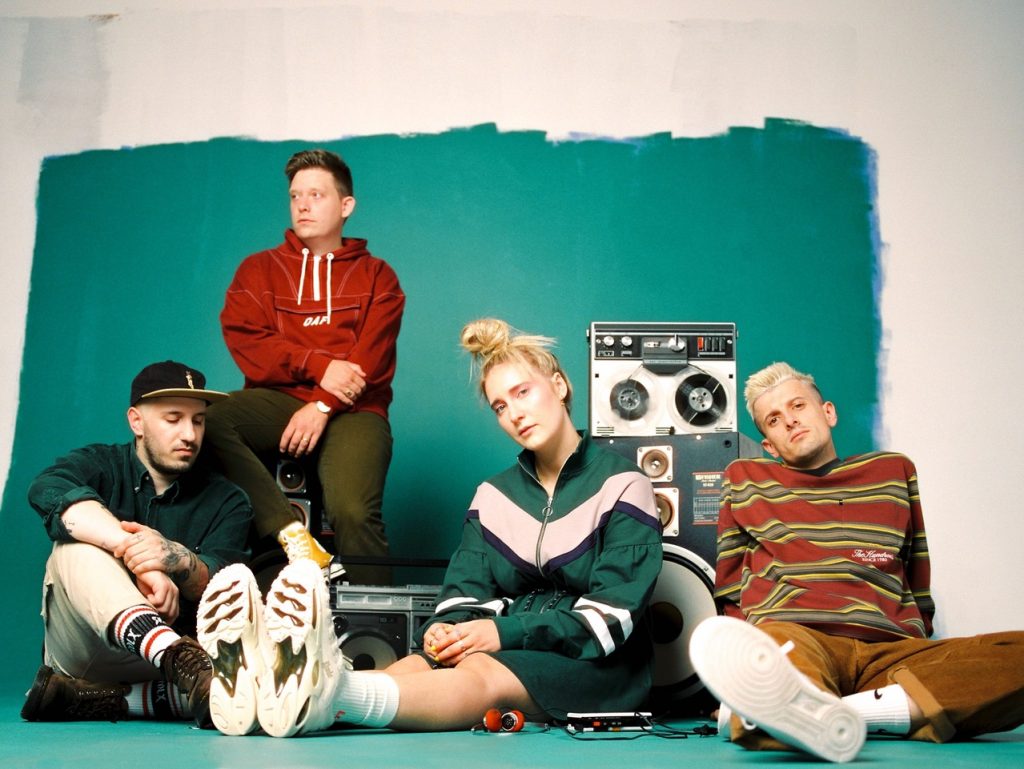
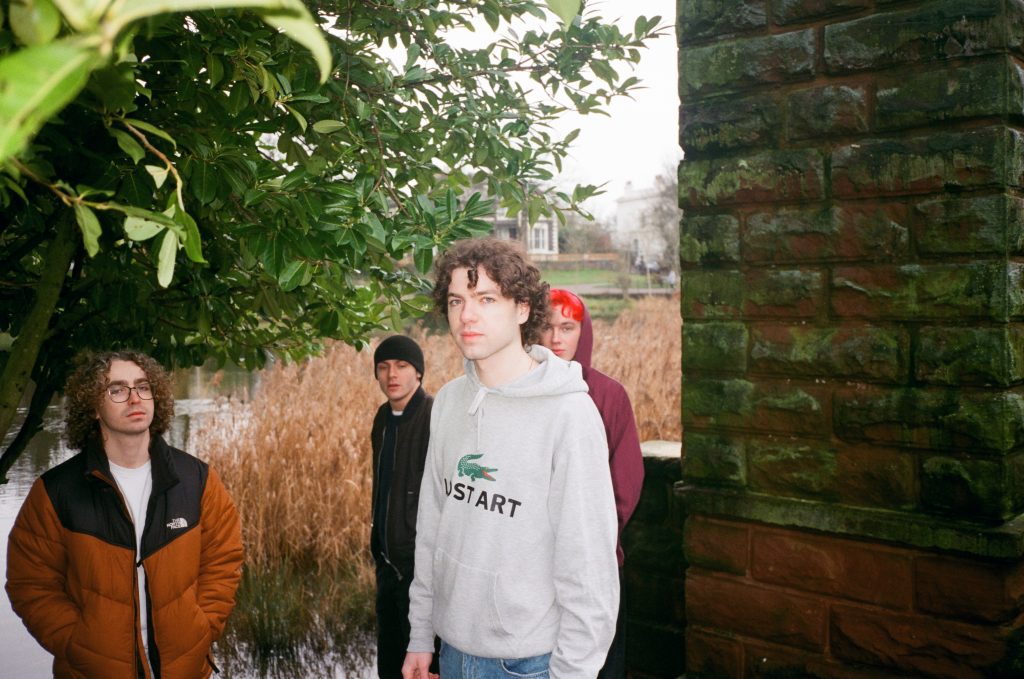
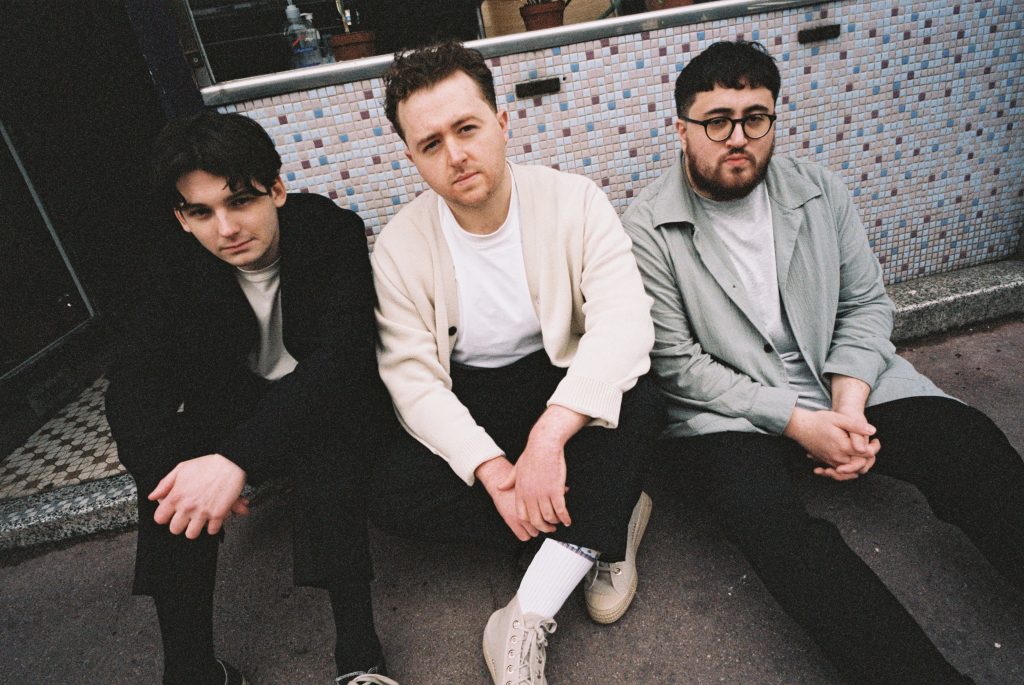
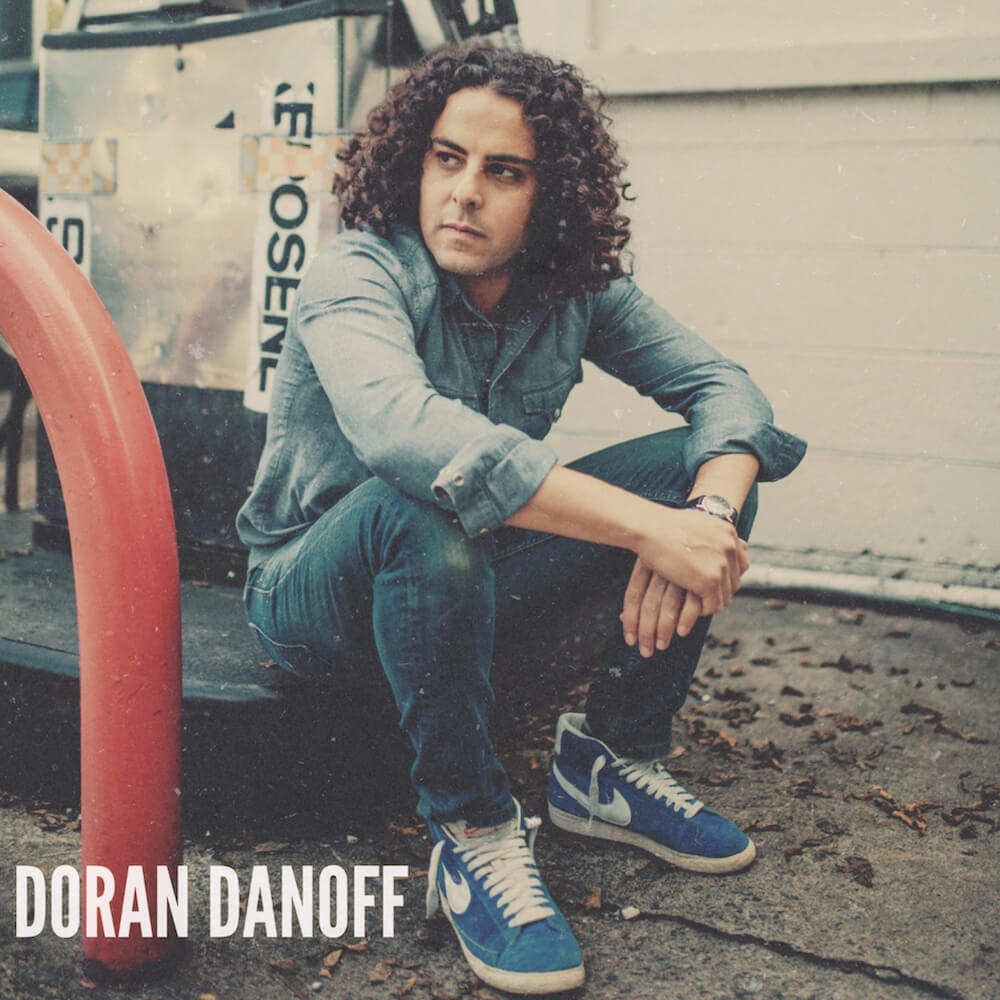
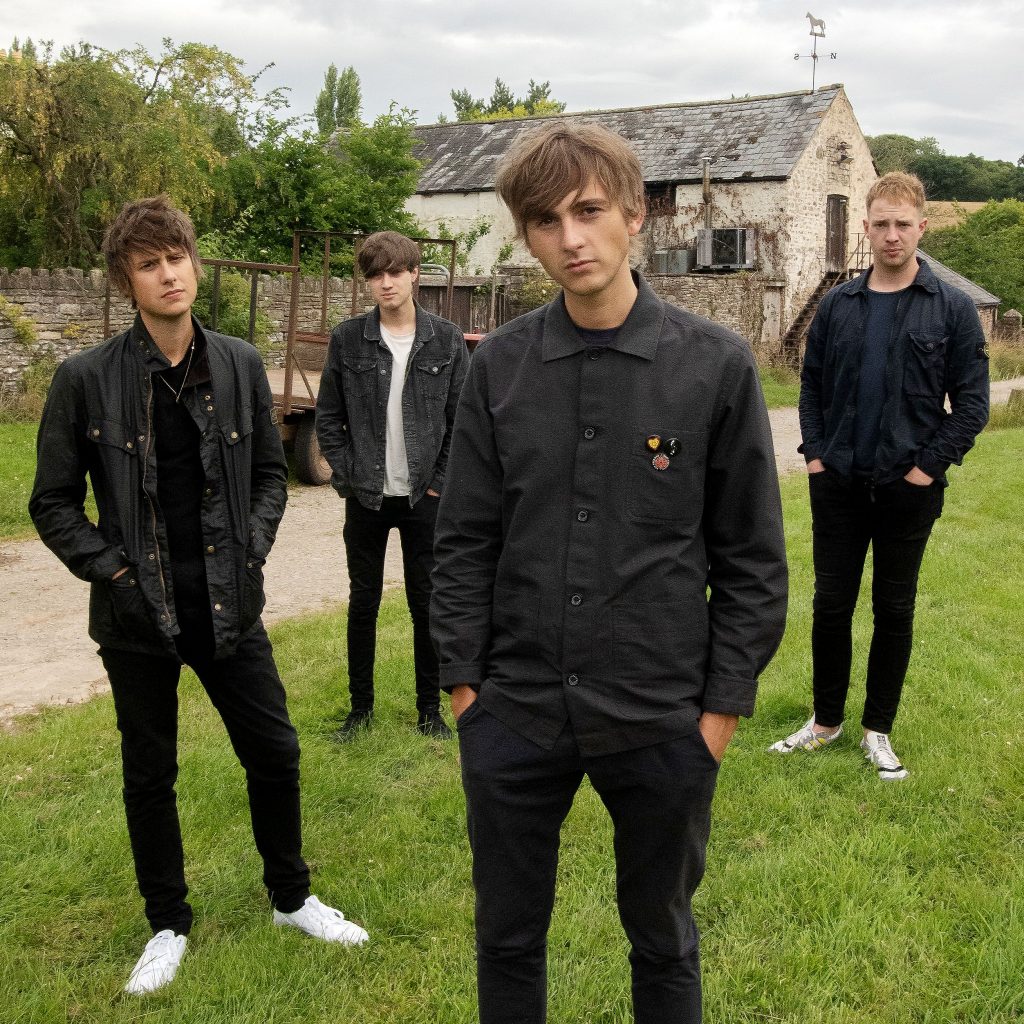
Responses